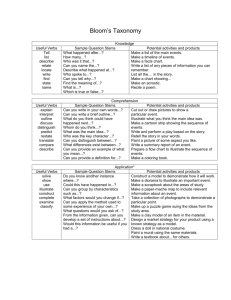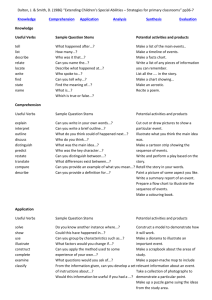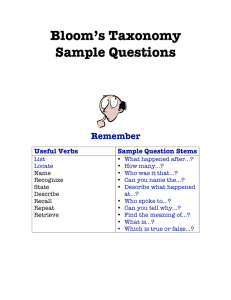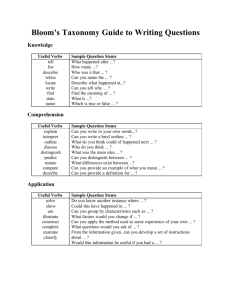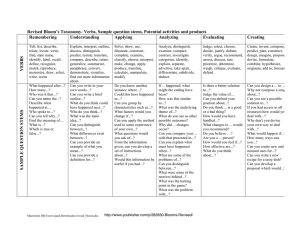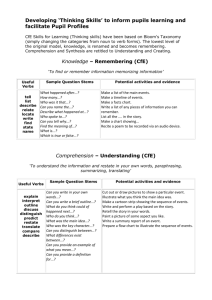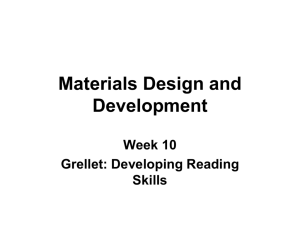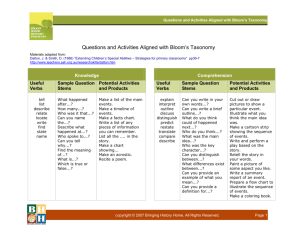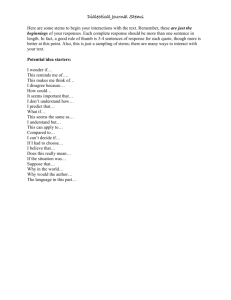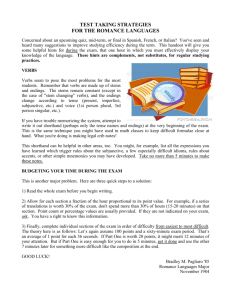Cognitive Domain of Bloom's Taxonomy
advertisement
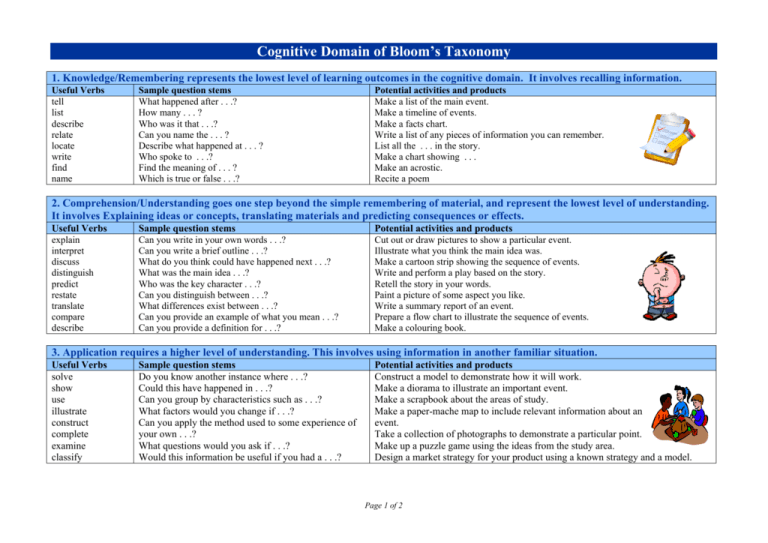
Cognitive Domain of Bloom’s Taxonomy 1. Knowledge/Remembering represents the lowest level of learning outcomes in the cognitive domain. It involves recalling information. Useful Verbs tell list describe relate locate write find name Sample question stems What happened after . . .? How many . . . ? Who was it that . . .? Can you name the . . . ? Describe what happened at . . . ? Who spoke to . . .? Find the meaning of . . . ? Which is true or false . . .? Potential activities and products Make a list of the main event. Make a timeline of events. Make a facts chart. Write a list of any pieces of information you can remember. List all the . . . in the story. Make a chart showing . . . Make an acrostic. Recite a poem 2. Comprehension/Understanding goes one step beyond the simple remembering of material, and represent the lowest level of understanding. It involves Explaining ideas or concepts, translating materials and predicting consequences or effects. Useful Verbs explain interpret discuss distinguish predict restate translate compare describe Sample question stems Can you write in your own words . . .? Can you write a brief outline . . .? What do you think could have happened next . . .? What was the main idea . . .? Who was the key character . . .? Can you distinguish between . . .? What differences exist between . . .? Can you provide an example of what you mean . . .? Can you provide a definition for . . .? Potential activities and products Cut out or draw pictures to show a particular event. Illustrate what you think the main idea was. Make a cartoon strip showing the sequence of events. Write and perform a play based on the story. Retell the story in your words. Paint a picture of some aspect you like. Write a summary report of an event. Prepare a flow chart to illustrate the sequence of events. Make a colouring book. 3. Application requires a higher level of understanding. This involves using information in another familiar situation. Useful Verbs solve show use illustrate construct complete examine classify Sample question stems Do you know another instance where . . .? Could this have happened in . . .? Can you group by characteristics such as . . .? What factors would you change if . . .? Can you apply the method used to some experience of your own . . .? What questions would you ask if . . .? Would this information be useful if you had a . . .? Potential activities and products Construct a model to demonstrate how it will work. Make a diorama to illustrate an important event. Make a scrapbook about the areas of study. Make a paper-mache map to include relevant information about an event. Take a collection of photographs to demonstrate a particular point. Make up a puzzle game using the ideas from the study area. Design a market strategy for your product using a known strategy and a model. Page 1 of 2 4. Analysis represents a higher intellectual level than comprehension and application because it requires an understanding of both content and the structural form of material. It involves breaking information into parts to explore understandings and relationships. Useful Verbs analyse distinguish examine compare contrast investigate categorise identify explain separate advertise Sample question stems Which events could have happened . . .? If . .happened, what might the ending have been? How was this similar to . . . ? What was the underlying theme of . . .? What did you see as other possible outcomes? Why did . . . changes occur? Can you compare your . . .with that presented in . . . ? Can you explain what must have happened when . . .? How is . . . similar to . . . ? What are some of the motives behind . . . ? What was the turning point in the game? Potential activities and products Design a questionnaire to gather information. Write a commercial to sell a new product. Conduct an investigation to produce information to support view. Make a flow chart to show the critical stages. Construct a graph to illustrate selected information. Make a jigsaw puzzle. Make a family tree showing relationships. Put on a play about the study area. Write a biography of the study person. Prepare a report about the area of study 5. Evaluation is the second highest cognitive activity because it involves making conscious value judgements based on clearly defined criteria, and justifying the decision or course of action taken. Useful Verbs judge, critique hypothesise experiment decide, rate justify, verify debate, discuss argue Sample question stems Is there better solution to . . . Judge the value of . . . Can you defend your position about . . .? Do you think . . . is a good or a bad thing? How would you have handled . . .? What changes to . . . would you recommend? Do you believe . . .? Potential activities and products Prepare a list of criteria to judge a show. Indicate priority and ratings. Conduct a debate about an issue of special interest. Make a booklet about five rules. Convince others. Form a panel to discuss views e.g. “Learning at School”. Write a letter to . . . advising on changes needed at . . . Write a half yearly report. Prepare a case to present your view about . . . 6. Synthesis (creating) is the highest cognitive level. It involves generating new ideas, products, or ways of viewing things. Useful Verbs create, invent compose predict plan construct design imagine propose devise Sample question stems Can you design a . . . to . . .? Why not compose a song about . . .? Can you see a possible solution to . . .? If you had access to all resources how would you deal with . . .? What would happen if . . . ? How many ways can you . . . ? Can you create new and unusual uses for . . . ? Can you write a new recipe for a tasty dish? Potential activities and products Invent a machine to do a specific task. Design a building to house your study. Plan a marketing campaign for a new product created by you. Write about your feelings in relation to . . .? Write a tv show, play, puppet show, role play, song or pantomime about . . . Design a record, book or magazine cover for . . . ? Make a new language code and write material using it. Sell an idea. Page 2 of 2
